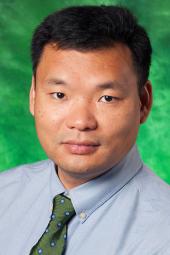Preschool-aged children in low socio-economic status families comprise one particular group of children who are at increased risk for sedentary behavior, and consequently have heightened risk of incidence of chronic disease such as childhood obesity. As a federal program serving children and families who have a low-income status, Head Start centers are in a unique position to not only shape preschoolers' physically active lifestyles, but also to influence public health. Guided by the social ecological model, the major goal of this COE funded project is to determine the efficacy of a Head Start center-based physical activity intervention on underserved (racially/ethnically diverse and socioeconomically disadvantaged) preschoolers' physical activity and health-related outcomes. The project will implement a multilevel intervention program involving physical activity policies, processes, and practices in the Head Start centers. The generated knowledge from this project will provide meaningful resources and insights for Head Start centers in addressing the physical activity and health disparities of these underserved preschoolers by implementing a comprehensive physical activity program. With the support of COE collaborative research award in 2019, the research team will be able to collect meaningful preliminary data in underserved preschoolers, which is important to design and develop a competitive NIH R21/R01 research grant application in the future.

